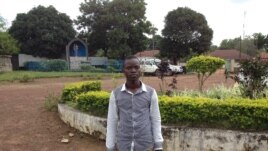The number of Ebola cases continues rising. But there is some hope for those who survive the disease. Recently, a conference for Ebola survivors was held for the first time in eastern Sierra Leone. The goal was to offer advice to survivors and look at ways they can increase people’s understanding of the disease.
That music is coming from a small church in Kenema, Sierra Leone. Inside the building, 36 Ebola survivors danced in celebration. All 36 have beaten the deadly virus for which there is no vaccine.
Sierra Leone’s Ministry of Health and Sanitation organized the conference of Ebola survivors. The ministry and non-governmental organizations want them to advise other Ebola patients and teach people more about the disease and its prevention.
 Matthew Dalling is chief of child protection with UNICEF, the United Nations Children’s Fund. He says survivors often face problems when they return to their communities.
Matthew Dalling is chief of child protection with UNICEF, the United Nations Children’s Fund. He says survivors often face problems when they return to their communities.
“They go back into communities and they are ostracized, and are told to leave. One or two survivors I met are renting (home) in Kenema city because they can’t go back to their rural villages. So what we want to do is find a way that we can actually get them to go back into their communities to become helpers and to really make them become advocates and champions. We really see them as heroes.”
Fatama Feremusu Sesay is a nurse. She became sick with the disease while caring for an Ebola patient who threw up on her. She blames her infection on the light material she was wearing at the time. She says the vomit from the patient’s stomach touched her skin.
Today the health care worker is happy to be alive. She says she wants to become an activist in her community because some people still do not believe Ebola is real.
“There was a rumor that we the nurses, they (the government) have give us a huge amount of money and we are the ones who are killing the people, we inject the people … we (the) killers.”
It is claims like those that Ebola survivor Dauda Mohamed Fullah wants to stop. He works as a laboratory technician at the government hospital in Kenema. He also has faced rejection from people because he had Ebola. But for him, the hardest part is that other members of his family also got infected and did not survive.
“I think about them sometimes. I have nightmares. In my dreams, I do see them, playing with them. Even last night I had a dream. Yeah, I had a dream, I saw my father and, you know, I couldn’t bear it. I wanted to go to him, but he rejected me, said ‘No.’ So I started carrying in my dreams, so I woke up with tears in my eyes.”
Many survivors have similar experiences. Jamilah Jawara had two children. Both died from Ebola.
“It was June 17th. I lost my two kids, they were in my hands. The first one died, the boy.”Her daughter died a short time later.
These stories can have a huge emotional effect on survivors.
Margaret Harris of the World Health Organization says the idea of having survivors work with patients and in communities is good. But she adds that the survivors need to make sure they are ready and should not feel that they are required to help.
Dr. Harris says it is also important to take all necessary steps to stay healthy.
“For instance, people are talking about survivors going, being perfectly safe from ever being infected again. Well, we haven’t done antibody levels (on them). We know people have survived this thing, but we do not know they are 100 percent protected and we have to make sure they are medically safe.”
Sierra Leone’s Ministry of Health and Sanitation says the country had 634 Ebola survivors as of October 19th. UNICEF officials say there will be similar conferences planned for survivors across the country.
I’m Bob Doughty.
This report was based on a story from reporter Nina de Vries in
Kenema, Sierra Leone. George Grow wrote it for Learning English. The
editor was Ashley Thompson.

